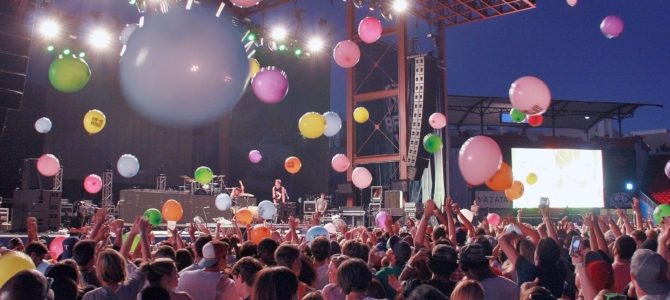Breakaway Music Festival may be putting lives at risk this year by prohibiting water bottles and Camelbak-style backpacks at its events in Ohio this weekend with a weather forecast featuring prime conditions that could lead to dehydration among attendees.
It’s an unusual move by a music festival, which typically feature staffed water stations at multiple locations around the concert grounds. The decision to prohibit guests from bringing containers to store water throughout the event brings serious danger to attendees dancing in the August summer sun for hours on end.
“I didn’t think it was real at first,” said Aaron Schwallier when he first read about the policy. A 26-year-old music teacher in Michigan who plans on going this weekend, Schwallier has been attending music festivals for years and has never seen such a policy.
Festivals often allow guests to bring Camelbak-style backpacks and water bottles into the concert-grounds upon emptying their contents before entering.
“Pretty much every festival, you have free water. You fill up your water bottle and fill up your camelbaks and that’s how you stay hydrated and have a good time,” Schwallier told The Federalist.
Providing adequate water accessibility at festivals where alcohol and drug use is rampant no matter how strict security gets is not only a preferred standard of safety for attendees but a minimum requirement, according to experts.
In 2015, the Canadian province of British Columbia commissioned a study to reduce drug- and alcohol-related harms at such events and found that, at the bare minimum, festivals should provide easy and reliable access to water for concert-goers. Similar guidelines issued by the Drug Policy Alliance, a New York City-based non-profit organization, reported the same conclusion, that festivals should provide adequate water and shade for attendees.
Even taking drugs and alcohol out of the mix, dancing in the hot summer sun all day long can still lead to dehydration.
“Dehydration is actually the number one thing that gets people transported out of festivals,” said Mitchell Gomez, the executive director of DanceSafe, a non-profit dedicated to promoting health and safety among electronic music enthusiasts.
Gomez cautioned that in addition to the moral and ethical pitfalls of Breakaway’s water policy this year in prohibiting items that would allow guests to make responsible decisions, the festival is also risking its own money by gambling on patrons purchasing water at the event.
“If you’re only selling water, that’s literally forcing someone to make the decision between hydration and financial stability,” Gomez said, noting that such a policy could lead to problems that are legally actionable if things go wrong.
Last month, Breakaway announced that water refill stations would be present at the event, and that the policy prohibiting outside storage devices was the venue’s.
There will be water refill stations at Breakaway Ohio! Unfortunately due to venue policy, camelbacks are not allowed into the festival.
— Breakaway Festival (@BreakawayFest) July 31, 2019
Breakaway was not clear, however, whether it would provide bottles to guests or if guests would be required to first purchase one. The festival declined multiple requests from The Federalist to comment.
“If they’re giving out free water, I would still find this problematic,” Gomez told The Federalist. “You still need a way to carry your water.”
Alex Denmeade, 28, goes to at least four to six music festivals every year with a group of friends promoting mental health awareness, and Breakaway Ohio will be the group’s 8th in 2019.
“This is the first time I’ve seen a no Camelbak or water bottle policy,” Denmeade told The Federalist. “I’ve seen limitations… but the fact that they’re saying that nothing is allowed is a little ridiculous.”
Schwallier and Denmeade said they planned to buy bottled water inside the event. Schwallier noted that while some might chastise those willing to pay $60 for a festival ticket but not a few extra dollars for what will likely be overpriced water inside the event, people fail to realize that often festival-goers did not pay for their own tickets. Attendees often receive the tickets as gifts from friends or family.
“People aren’t going to drink water, probably, is what’s going to happen,” Schwallier said.
Andy Meyer is a 24-year-old from Columbus, Ohio who has been attending music festivals for three to four years now. Meyer, like many others, is an ardent conservationist worried about society’s over-consumption of plastic. Meyer said that in addition to the safety concerns, the festival’s incentive to purchase plastic bottles of water is a problem of environmental sustainability.
“My huge point of contention is the wastefulness,” Meyer told The Federalist. “In terms of festivals aiming to be zero-waste, it’s a hindrance of that effort.”









